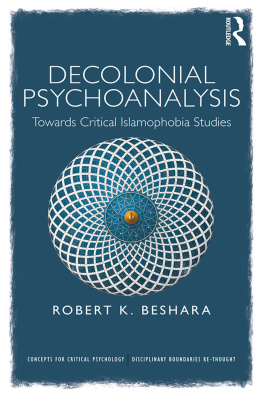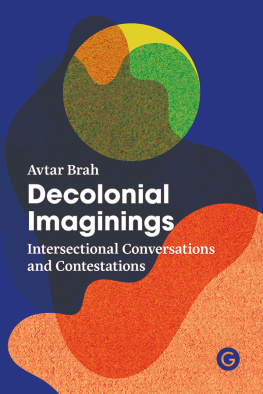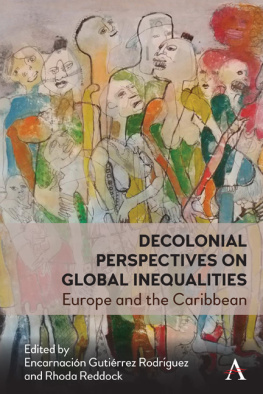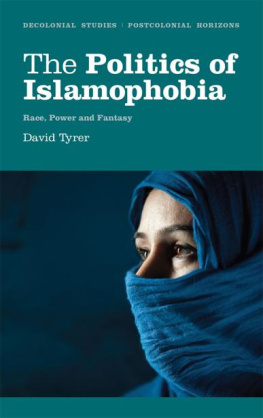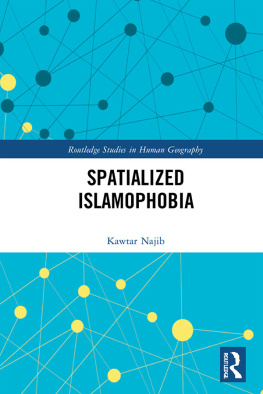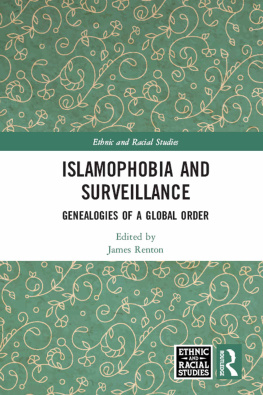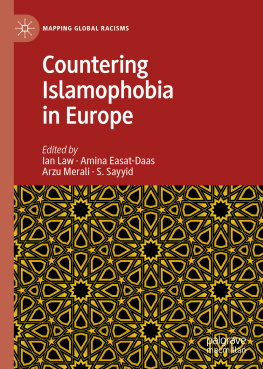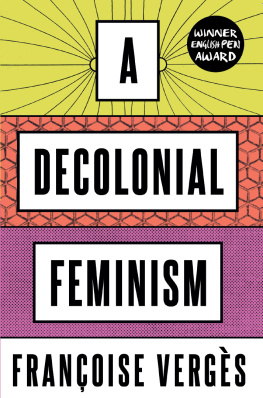Beshara - Decolonial psychoanalysis : towards critical Islamophobia studies
Here you can read online Beshara - Decolonial psychoanalysis : towards critical Islamophobia studies full text of the book (entire story) in english for free. Download pdf and epub, get meaning, cover and reviews about this ebook. year: 2019, publisher: Routledge, genre: Politics. Description of the work, (preface) as well as reviews are available. Best literature library LitArk.com created for fans of good reading and offers a wide selection of genres:
Romance novel
Science fiction
Adventure
Detective
Science
History
Home and family
Prose
Art
Politics
Computer
Non-fiction
Religion
Business
Children
Humor
Choose a favorite category and find really read worthwhile books. Enjoy immersion in the world of imagination, feel the emotions of the characters or learn something new for yourself, make an fascinating discovery.
Decolonial psychoanalysis : towards critical Islamophobia studies: summary, description and annotation
We offer to read an annotation, description, summary or preface (depends on what the author of the book "Decolonial psychoanalysis : towards critical Islamophobia studies" wrote himself). If you haven't found the necessary information about the book — write in the comments, we will try to find it.
Beshara: author's other books
Who wrote Decolonial psychoanalysis : towards critical Islamophobia studies? Find out the surname, the name of the author of the book and a list of all author's works by series.
Decolonial psychoanalysis : towards critical Islamophobia studies — read online for free the complete book (whole text) full work
Below is the text of the book, divided by pages. System saving the place of the last page read, allows you to conveniently read the book "Decolonial psychoanalysis : towards critical Islamophobia studies" online for free, without having to search again every time where you left off. Put a bookmark, and you can go to the page where you finished reading at any time.
Font size:
Interval:
Bookmark:

DECOLONIAL PSYCHOANALYSIS
In this provocative and necessary book, Robert K. Beshara uses psychoanalytic discursive analysis to explore the possibility of a genuinely anti-colonial critical psychology. Drawing on postcolonial and decolonial approaches to Islamophobia, this book enhances understandings of Critical Border Thinking and Lacanian Discourse Analysis, alongside other theoretico-methodological approaches.
Using a critical decolonial psychology approach to conceptualize everyday Islamophobia, the author examines theoretical resources situated within the discursive turn, such as decoloniality/transmodernity, and carries out an archeology of (counter)terrorism, a genealogy of the conceptual Muslim, and a iekian ideology critique. Conceiving of Decolonial Psychoanalysis as one theoretical resource for Critical Islamophobia Studies (CIS), the author also applies Lacanian Discourse Analysis to extracts from interviews conducted with US Muslims to theorize their ethico-political subjectivity and considers a politics of resistance, adversarial aesthetics, and ethics of liberation.
Essential to any attempt to come to terms with the legacy of racism in psychology, and the only critical psychological study on Islamophobia in the United States, this is a fascinating read for anyone interested in a critical approach to Islamophobia.
Robert K. Beshara is a critical psychologist, interested in theorizing subjectivity vis--vis ideology through radical qualitative research (e.g., discourse analysis). In addition to being a scholar-activist, he is a fine artist with a background in film, theater, and music. He holds two terminal degrees: a Ph.D. in Psychology: Consciousness and Society from the University of West Georgia and an M.F.A. in Independent Film and Digital Imaging from Governors State University, Illinois. He currently works as an Assistant Professor of Psychology at Northern New Mexico College. For more information visit: www.robertbeshara.com
Concepts for Critical Psychology: Disciplinary Boundaries Re-thought
Series editor: Ian Parker
Developments inside psychology that question the history of the discipline and the way it functions in society have led many psychologists to look outside the discipline for new ideas. This series draws on cutting edge critiques from just outside psychology in order to complement and question critical arguments emerging inside. The authors provide new perspectives on subjectivity from disciplinary debates and cultural phenomena adjacent to traditional studies of the individual.
The books in the series are useful for advanced level undergraduate and postgraduate students, researchers, and lecturers in psychology and other related disciplines such as cultural studies, geography, literary theory, philosophy, psychotherapy, social work, and sociology.
Most recently published titles:
Deleuze and Psychology
Philosophical Provocations to Psychological Practices
Maria Nichterlein and John R. Morss
Rethinking Education through Critical Psychology
Cooperative Schools, Social Justice and Voice
Gail Davidge
Developing Minds
Psychology, Neoliberalism and Power
Elise Klein
Marxism and Psychoanalysis
In or Against Psychology?
David Pavn-Cullar
DECOLONIAL PSYCHOANALYSIS
Towards Critical Islamophobia Studies
Robert K. Beshara

First published 2019
by Routledge
2 Park Square, Milton Park, Abingdon, Oxon OX14 4RN
and by Routledge
52 Vanderbilt Avenue, New York, NY 10017
Routledge is an imprint of the Taylor & Francis Group, an informa business
2019 Robert K. Beshara
The right of Robert K. Beshara to be identified as author of this work has been asserted by him in accordance with sections 77 and 78 of the Copyright, Designs and Patents Act 1988.
All rights reserved. No part of this book may be reprinted or reproduced or utilised in any form or by any electronic, mechanical, or other means, now known or hereafter invented, including photocopying and recording, or in any information storage or retrieval system, without permission in writing from the publishers.
Trademark notice : Product or corporate names may be trademarks or registered trademarks, and are used only for identification and explanation without intent to infringe.
British Library Cataloguing-in-Publication Data
A catalogue record for this book is available from the British Library
Library of Congress Cataloging-in-Publication Data
A catalog record has been requested for this book
ISBN: 978-0-367-17349-4 (hbk)
ISBN: 978-0-367-17413-2 (pbk)
ISBN: 978-0-429-05661-1 (ebk)
Typeset in Bembo
by Deanta Global Publishing Services, Chennai, India
This book is dedicated to the memory of my uncle, Medhat Ghali Guirguis (19512017).
CONTENTS
I turned my dissertation (Beshara, 2018c) into this book: the outcome of prolonged theoretical and empirical research on the relationship between the War on Terror and Islamophobia. Over the years, I had the privilege of developing my research and sharing these developments with other scholars on a number of occasions. For example, I presented my research at the University of California, Berkeley three times: in 2015, 2016, and 2018. Hatem Bazianthe founder of the Islamophobia Research and Documentation Project and a member of my dissertation committeeorganizes the Annual International Conference on the Study of Islamophobia, and I am very grateful to him, because in 2015 I presented a draft of Beshara (2018a), which is the beginning of my discursive research into the topic. In 2016, I presented the next development of my worka Lacanian psychoanalytic readingat the Duquesne/UWG Human Science Symposium in Carrollton, Georgia. But the most significant development in my work took place in 2017 at the Islamic Psychoanalysis/Psychoanalytic Islam conference, which was co-organized by Ian Parker and Sabah Siddiqui on behalf of the College of Psychoanalysts and which took place at the University of Manchester, the UK. It was at that groundbreaking conference that I developed an original theoretico-methodological tool called decolonial psychoanalysis, (Beshara, 2018b) which I ended up developing further into my dissertation and eventually into this book.
Is psychoanalysis not part of the problem, antithetical to anything approaching critical psychology? And, worse, is psychoanalysis not the most insidious apparatus of psychologization, ensuring that people are not only monitored and disciplined by psychology, but also required to confess within its frame, required to really believe that psychological explanations for social phenomena are paramount? And, even worse, is psychoanalysis not the most arrogant aspect of Western psychology, enforcing a model of subjectivity that all those positioned as other to the West are trapped by, an intensely colonial theory and practice? All of these accusations against psychoanalysis must be encountered and answered in the affirmative if we are to take any steps forward to a genuinely anti-colonial critical psychology, and the surprising twist to the story told in this book is that psychoanalysis of some kind can then, if we are honest about how it usually functions, end up being a tool, not only of oppression, but also of liberation.
Robert K. Besharas psychoanalytic discursive analysis in this provocative and necessary book, essential to any attempt to come to terms with the legacy of racism in psychology, homes in on a new threat, a new other, marked by the signifier Islam. The twists and turns in the colonial heritage of the West now turn around an identitarian enemy, an enemy marked out by their identity rather than by their race. A series of linguistic devices attach this signifier to terrorism, and a variety of psycho-political strategies are used by those in power to then link the signifier to Muslims who dare to speak out about the way they are positioned within Islamophobic discourse. They are accused of cleaving to an identity that is actually constructed for them within dominant discourses of the War on Terror, counter-terrorism, and the increasing securitization of Western nation states. Is all this merely discursive? It is anything but. Islamophobia certainly is discursive, and here the book takes forward discourse-analytic work in critical psychology, but it is also, we come to see, material. The book elaborates, with the aid of psychoanalytic conceptions of subjectivity and power, an account of the centrality of so-called extra-discursive phenomena, a grounding of the analysis in a deeper theoretical understanding of what is going on when we appear to be merely describing the world and the people in it.
Font size:
Interval:
Bookmark:
Similar books «Decolonial psychoanalysis : towards critical Islamophobia studies»
Look at similar books to Decolonial psychoanalysis : towards critical Islamophobia studies. We have selected literature similar in name and meaning in the hope of providing readers with more options to find new, interesting, not yet read works.
Discussion, reviews of the book Decolonial psychoanalysis : towards critical Islamophobia studies and just readers' own opinions. Leave your comments, write what you think about the work, its meaning or the main characters. Specify what exactly you liked and what you didn't like, and why you think so.

